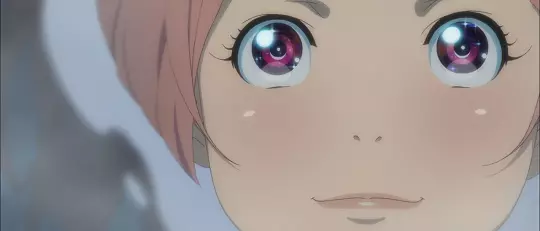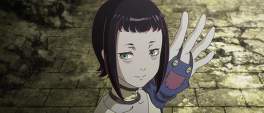The final ending card of *Rage of Bahamut: Genesis’ warned us: “I’ll be back”. For a time that seemed to refer to the indefinitely delayed Manaria Friends (not to be confused with your Italian food research group: marinara friends), until that is, Virgin Soul was announced. A direct sequel to Genesis with the same director - Keiichi Satou - and a returning cast of characters, would this new two-cour series be able to capture the same kind of adventuring fun that typified its predecessor?
Picking up ten years after the sealing of the Bahamut, humanity, under the new rule of King Charioce, have enslaved demons and begun to purge angels from their midsts. The fates of both Favaro and Kaisar are unknown and instead the impossibly cheerful and unusually brawny Nina takes centre stage. Unfortunately for her, she transforms into an enormous red dragon when coming into contact with a member of the opposite sex which has a detrimental effect on the buildings and people surrounding her when she does.
The “Virgin Soul” of the title then is fairly obvious and an appreciably meaty portion of the narrative is dedicated to Nina’s coming of age, both emotional and romantic. The other parts, like Genesis, are a shotgun blast of different influences and plot threads that briskly move the series along despite the roomy twenty four episode run time. Unlike Genesis though, Virgin Soul has loftier ambitions than frantically trying to cram as many fantasy tropes - pirates, dragons, angels and flying castles - into one series.
At first this is tackling the very obvious enslavement of the demons and is what causes Nina to collide with returning characters - first the dead-pan, gravelly voice necromancer Rita, followed by Kaisar and eventually Favaro. It doesn’t take long for the series to start dabbling with imperialism, faith versus enlightenment and agency, loss of innocence, the use of weapons... all while still trying to navigate Nina through a star crossed romance.
If this all sounds like a far cry from the romping travelogue that came before it, you would be absolutely right, and the writing takes a turn for the downright vicious in the second half with deaths and betrayals that are as brutal as they are unexpected. The bittersweet ending of the first series pales in comparison to the finale here and is one that, for better or worse, stuck with me for days after airing. Were you to speak to both Western and Japanese watchers, this would be the tipping point that saw many of them abandoning it, haemorrhaging almost 10,000 viewers from midpoint to closing by some estimates.
It’s not difficult to see why: going from free-to-play mobile game to the fun but largely ignored first series, to a second dealing with Very Important Matters probably isn’t what you signed on for as either a fresh viewer or a returning fan. That’s not to say the topics or their treatment are mishandled, or that the world building or narrative foundations don’t support them, or even that the twists and turns are particularly spiteful, only that tilting towards a darker tone robs a lot of what made, at least me, excited for this sequel.
For a series that is bold, ambitious and confidently executed, I feel an ambivalent desire for the original’s penny-dreadful-esque whimsy. There really is a lot to like here. Nina is a brilliant central character who is fiercely independent yet chipper without being naive. Kaisar and Favaro have aged and grown in ways that feel natural, while Rita, Bacchus and Hamsa still riff off each other brilliantly. Jeanne, despite only being properly reintroduced well into the second act, has an absolutely stunning story arc and the time she spends travelling with Nina is a delight for what it reveals about both characters. Even secondary characters like Azazel and Lavelley come into their own here with pathos and drive while newcomers like Alessand are instrumental in what becomes the series majestically tragic turning point.
A sour note still remains though, and it’s name is Charioce. Pitched immediately as a kind of kitten-eating monster out to annihilate anything he can’t enslave, it’s bone-headedly obvious there is more going on with him. And there is. Except it’s really not that interesting and the story’s attempts to contextualise his motives falls flat and never manages to justify the horrors he presides over.
This, combined with Nina’s inexplicable affections for him, forms the lodestone for the series’ woes. Unable to empathise with him and not ultimately punishing his actions, it doesn’t matter how many grand-scale magic battles or dragon-based tomfoolery there is, the narrative and emotional payoff doesn’t happen. And that’s a shame because, it bears repeating, there is an awful lot to like; be that the incongruous return of SiM for the gorgeous three-colour opening, the superbly animated action or the dramatic highs and lows that follow the different characters. All the components were there for an absolute belter of a finale, yet the ending marrs the rest.
The entire ordeal is reminiscent of Sunrise’s followup to the wonderful [My-HiME](https://chaostangent.com/2009/12/anime-of-the-decade-6/), My-Otome which had a similarly squick inducing central relationship as well a lacklustre overall reception despite initial hype. Barring some woeful, short-lived spin offs, that series was also the death knell for the My-HiME franchise.
Whether the same will happen with Rage of Bahamut is still to be seen. I have a lot of fond memories watching Virgin Soul - and not just because of Jeanne D’Arc - and while it seems a little mean spirited to rubbish the whole series because of an unsatisfying ending, thinking of watching it from the start with that conclusion in mind fills me with dread. If this is the last of the franchise that would be an awful shame, but looking to future instalments to retroactively wash away the sour taste of the past seems equally unlikely and short sighted.








